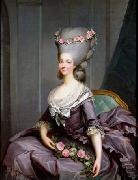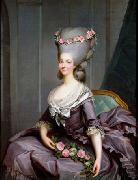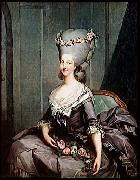Antoine-Francois Callet Olja Måleriet ReproduceringAll Antoine-Francois Callet Oil Paintings(1741-1823, Paris), generally known as Antoine Callet, was a French painter of portraits and allegorical works, who acted as official portraitist to Louis XVI. He won the grand prix de Rome in 1764 with Cleobis et Biton conduisent le char de leur mere au temple de Junon (Kleobis and Biton dragging their mother's cart to the temple of Juno). He was accepted by the Academie des beaux arts in 1779, with his entry piece being a portrait of the comte d'Artois, and received with his allegory Le printemps (Spring) in 1781. He exhibited at the Salon from 1783 onwards. He painted the centre of the ceiling of the grande galerie of the palais du Luxembourg, with a composition entitled L'Aurore (Aurora). Under the French Consulate and the First French Empire he painted several more allegories, including an Allegorie du dix-huit brumaire ou la France sauvee (Allegory of 18 Brumaire, or France saved - 1801, château de Versailles) and an Allegorie de la bataille d'Austerlitz (Allegory of the Battle of Austerlitz - 1806, château de Versailles). |
|||

|
|||
|
|
|||
|
||||||||
| Antoine-Francois Callet (1741-1823, Paris), generally known as Antoine Callet, was a French painter of portraits and allegorical works, who acted as official portraitist to Louis XVI. He won the grand prix de Rome in 1764 with Cleobis et Biton conduisent le char de leur mere au temple de Junon (Kleobis and Biton dragging their mother's cart to the temple of Juno). He was accepted by the Academie des beaux arts in 1779, with his entry piece being a portrait of the comte d'Artois, and received with his allegory Le printemps (Spring) in 1781. He exhibited at the Salon from 1783 onwards. He painted the centre of the ceiling of the grande galerie of the palais du Luxembourg, with a composition entitled L'Aurore (Aurora). Under the French Consulate and the First French Empire he painted several more allegories, including an Allegorie du dix-huit brumaire ou la France sauvee (Allegory of 18 Brumaire, or France saved - 1801, château de Versailles) and an Allegorie de la bataille d'Austerlitz (Allegory of the Battle of Austerlitz - 1806, château de Versailles). |
||||||||
|
|
||||||||
| Måleriet Identifieringen :: 82175 Portrait of Madame de Lamballe Date ca. 1776(1776) Medium Oil on canvas Dimensions 214 x 158 cm (84.3 x 62.2 in) cjr |
||||||||
|
|
||||||||
| Måleriet Identifieringen :: 85789 Portrait of Madame de Lamballe 1776(1776) Medium Oil on canvas Dimensions 214 x 158 cm (84.3 x 62.2 in) cyf |
||||||||
|
|
||||||||
| Måleriet Identifieringen :: 86873 Portrait of Madame de Lamballe . 1776(1776) Medium Oil on canvas Dimensions 214 x 158 cm (84.3 x 62.2 in) cyf |
||||||||
|
|
||||||||
|
| FÖREGÅENDE KONSTNÄR Nästa Konstnär | |||||||
|
|
||||||||
|
Antoine-Francois Callet (1741-1823, Paris), generally known as Antoine Callet, was a French painter of portraits and allegorical works, who acted as official portraitist to Louis XVI. He won the grand prix de Rome in 1764 with Cleobis et Biton conduisent le char de leur mere au temple de Junon (Kleobis and Biton dragging their mother's cart to the temple of Juno). He was accepted by the Academie des beaux arts in 1779, with his entry piece being a portrait of the comte d'Artois, and received with his allegory Le printemps (Spring) in 1781. He exhibited at the Salon from 1783 onwards. He painted the centre of the ceiling of the grande galerie of the palais du Luxembourg, with a composition entitled L'Aurore (Aurora). Under the French Consulate and the First French Empire he painted several more allegories, including an Allegorie du dix-huit brumaire ou la France sauvee (Allegory of 18 Brumaire, or France saved - 1801, château de Versailles) and an Allegorie de la bataille d'Austerlitz (Allegory of the Battle of Austerlitz - 1806, château de Versailles). |
||||||||
|
|
||||||||
|
KOMMA I KONTAKT MED Oss |








